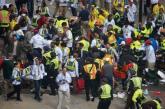Fifty-one runners and spectators remained hospitalized April 23 with injuries from the Boston Marathon bombings, according to the Boston Public Health Commission.
With a total of 264 patients treated at Boston area hospitals, "the team approach [was] vital," said Dr. Jeffrey Kalish, director of endovascular surgery at Boston Medical Center. "These types of injuries require multiple teams talking together and working together. It taught us really how to work together across multiple disciplines in a really acute time frame."
At BMC, "the initial approach was gathering every single surgeon available and figuring out who could do which specific operations," Dr. Kalish said.
"On the first day, the goal was to get the patients in and out of the operating room and stop the bleeding," he said. The next day [Tuesday], "we got together as a big group and talked about every patient and decided who was going to take over their care."
Teams met twice a day and while the surgeons focused on the patients, the hospital leadership made sure that adequate staff and infrastructure were available.
"This [experience] really taught me the importance of practicing for the unthinkable and practicing for the unknown, so when these things happen, it’s not as much of a surprise," said Dr. Kalish. "Talking about command structure and incident reporting and how to deploy the resources to the best of hospital’s knowledge is a very worthwhile thing."
Five patients at BMC have had above- or below-the-knee amputations and have averaged at least two surgical procedures each. One patient has had five.
For those with amputations, wound healing and pain control are now the most important factors, according to Dr. Simona Manasian, a rehabilitation medicine physician at BMC. Once the wounds are healed, the focus turns to shaping the stumps for prostheses.
Patients have begun early rehabilitation and physical therapy to strengthen the lower limbs and their upper bodies for mobility and support.
Patients also have been receiving psychological support, Dr. Manasian said. She added that they have been visited by several veterans who were similarly injured in Iraq or Afghanistan and who are farther along in adapting to amputations and prostheses. "That was very helpful."
Dr. Kalish added, "We’ve seen a full range of emotions over the past week. But now that we’re a week into this, everyone’s emotionally doing much better. [The patients are] optimistic, and they know that life will be a little different, but life is not over."
nmiller@frontlinemedcom.com
On Twitter @NaseemSMiller
